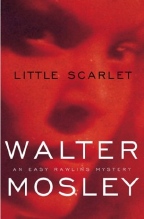Little Scarlet
Walter Mosley
Little, Brown and Company/Time Warner Book Group
US Hardcover First
ISBN: 0-316097393-2
Publication Date: July, 2004
306 Pages; $24.95
Date Reviewed: August 24, 2004
Reviewed by: Terry DAuray © 2004

REFERENCES
COLUMNS
|
|
|
Little ScarletWalter MosleyLittle, Brown and Company/Time Warner Book GroupUS Hardcover FirstISBN: 0-316097393-2Publication Date: July, 2004306 Pages; $24.95Date Reviewed: August 24, 2004Reviewed by: Terry DAuray © 2004 |
|
|
REFERENCES |
COLUMNS |
America is a racially divided country, a country that looks different depending on the color of your skin and your side of the tracks. We see in the news, on T.V., and in the movies that the Black experience in America is vastly different from the white one. We readers know that! Mosley, in 'Little Scarlet' and his previous Easy Rawlins mysteries, simply changes that verb from "know" to "live", and by doing so, instantly changes the reader from passive observer to active participant in a world that's just not quite right. Mosley wraps that racial disquiet in a damned good crime story, peoples it with believable characters and seeps it all in rich and vividly authentic Los Angeles atmosphere.
Set in Watts just after the violent riots of 1965, 'Little Scarlet' begins with the search for a white man seen fleeing the scene of the torturous murder of a black woman. The white officers of the LAPD are fearful of rekindling racial violence by pursuing an investigation of this chief suspect on their own. They ask Easy Rawlins, an uncredentialed black detective at home in black neighborhoods, to investigate on their behalf. Thus begins a complicated and uncomfortable alliance between Rawlins and his LAPD contact, Detective Suggs. They follow a convoluted but eminently believable path to a complicated and uncomfortable truth.
Easy Rawlins, Mosley's recurring crime series character, is a multi-faceted creation. Quick to anger or take offense, even where none may be intended, and equally quick with his fists, he is also expressly generous, kind and caring. Easy's inner conflict belies his name. He's an uneasy mix of anger and compassion, hatred and forgiveness, all coursing with pure So Cal seethe. While Rawlins is clearly the star of this show, Mosley understands that the world also awards Oscars for supporting roles. He surrounds Easy with a stellar ensemble cast of believable, lively and unique characters, many from earlier novels. Mouse (played by Don Cheadle in 'Devil in the Blue Dress', in a superlative bit of right-on casting), Jackson Blue, Jewell, Bonnie and Easy's kids return to enhance 'Little Scarlet' just as they enrich Easy's life.
Mosley is a gifted storyteller, with firm control of his plot and pacing that reveals just enough twists to keep the pages turning and the appetite whetted. Mosley's story is one of courage and violence. Mosely finds bloodshed in the streets of Watts and the streets of Pasadena, in the hospitals, cafes, police stations and bookstores of LA. Yet he takes time from the primary action to write with compassion of the black community and of "little" moments - the café waitress who delivers Easy's breakfast, hands trembling with fear at the mere presence of this big, Black man; or the bookstore owner camped on his steps for many sleepless days to guard his store from looters.
Mosley's writing is simple and clean, lean but lyrical. His easy action-driving prose evokes sun-drenched LA brightness and exposes the darkness lurking below the shiny façade. His story is rooted in the moat that separates black and white like a racial neap tide, as powerful and inexorable as a force of nature. Yet Mosley lets that racial divide be bridged - warily and slowly - with one-on-one personal connections between characters who share human values free of color.
'Little Scarlet' would make a compelling double bill with George Pelecanos' 'Hard Revolution'. They share a unity of racial themes and historical timeframes, but also present a striking contrast. Pelecanos' burned-out urban wasteland is vastly more barren than Mosley's sun-drenched So Cal blight, where even the ghetto has trees and flowers - East Coast versus West. Pelecanos' urban staccato prose and street slang contrasts with Mosley's laid-back, laconic language. Both are top-rated pros writing urban crime stories of action and violence mixed with social insight; strongly personal stories set within a social climate that defines and limits based on color and economics. Both Mosley and Pelecanos infuse their narratives with a political agenda, yet neither forgets, at the end of the day, to create compelling characters and to tell a believable and insightful story.
[Editor's note: Terry turned in an additional paragraph of commentary. Both she and I felt the material she covered had the potential to act as a spoiler for important plot elements in 'Little Scarlet'. Once you read the novel, if you've already read the novel, or if you aren't concerned about PLOT SPOILERS, read Terry's final paragraph of perceptive commentary.]